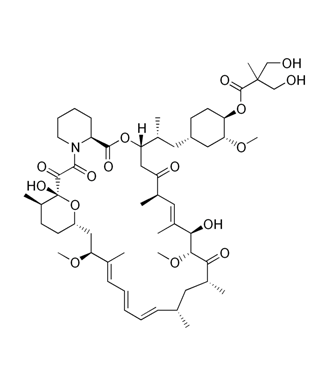Temsirolimus Fails in Metastatic RCC Trials
In two phase III trials, the mTOR inhibitor temsirolimus failed to improved progression-free survival outcomes for patients with metastatic renal cell carcinoma compared with other therapeutic options.
Chemical structure of temsirolimus

The mTOR inhibitor temsirolimus failed to improved progression-free survival outcomes for patients with metastatic renal cell carcinoma compared with two other therapeutic options, according to the results of two phase III trials published recently in the Journal of Clinical Oncology.
In the INTORACT trial, conducted by Brian I. Rini, MD, of the Cleveland Clinic and colleagues, treatment with temsirolimus plus VEGF inhibitor bevacizumab was not superior to treatment with interferon plus bevacizumab for first-line treatment.
According to the researchers, everolimus, another approved mTOR inhibitor, has also failed to show improved outcomes when combined with bevacizumab for first-line treatment. Taken together, these studies confirm “the lack of evidence that combination therapy simultaneously blocking both VEGF and mTOR pathways offers any advantage over interferon/bevacizumab, other approved single agents, or sequential blocking of VEGF and mTOR pathways,” the researchers wrote.
The second study, by Thomas E. Hutson, DO, of Baylor University Medical Center, and colleagues looked at temsirolimus as a second-line treatment of metastatic renal cell carcinoma after patients had progressed on the VEGF inhibitor sunitinib. Results indicated that temsirolimus conferred no survival advantage compared with VEGF inhibitor sorafenib as a second-line treatment.
“Because we believe clear-cell renal cell carcinoma is an HIF (hypoxia-inducible factor)/VEGF-driven tumor, it follows that persistent VEGFR inhibition may be a reasonable treatment option for patients with renal cell carcinoma,” the researchers wrote. “Therefore, sustained VEGFR inhibition by sequential tyrosine kinase inhibitors may be an important mechanistic explanation for the result in this trial.”
INTORACT Trial
In the INTORACT Trial, Rini and colleagues randomly assigned 791 patients with treatment-naive metastatic renal cell carcinoma to treatment with temsirolimus/bevacizumab (n = 400) or interferon/bevacizumab (n = 391). The primary endpoint was progression-free survival.
Upon final analysis of the data, no significant difference in progression-free survival was found between temsirolimus/bevacizumab and interferon/bevacizumab (9.1 months vs 9.3 months; P = .8). When evaluating survival in subgroups, the researchers found no significant difference by prior nephrectomy status, MSKCC prognostic group, age, sex, race, or geographic region.
Results also showed no significant difference for overall response rate (27% vs 27.4%) or overall survival (25.8 months vs 25.5 months) between temsirolimus/bevacizumab and interferon/bevacizumab.
Patients assigned to the temsirolimus group experienced significantly more grade 3 or worse mucosal inflammation, stomatitis, hypophosphatemia, hyperglycemia, and hypercholesterolemia.
Second-Line Treatment
Hutson and colleagues sought to do a direct comparison of an mTOR inhibitor and a VEGF inhibitor in the second-line treatment of metastatic renal cell carcinoma. The international phase III study enrolled 512 patients and randomly assigned them to treatment with temsirolimus (n = 259) or oral sorafenib (n = 253). Again, the primary endpoint was progression-free survival.
Temsirolimus demonstrated no advantage in terms of progression-free survival compared to sorafenib. At follow-up, the median progression-free survival was 4.3 months for temsirolimus compared with 3.9 months for sorafenib. Patients assigned temsirolimus had a median overall survival of 12.3 months compared with 16.6 months for patients in the sorafenib arm.
Subgroup analyses showed that patients with prior nephrectomy, longer duration of prior sunitinib, and MSKCC intermediate risk had an overall survival benefit when treated with sorafenib compared with temsirolimus.
“The longer overall survival with sorafenib is consistent with the hypothesis that sequenced VEGFR inhibition results in improvement in overall survival in patients with metastatic renal cell carcinoma,” the researchers wrote.